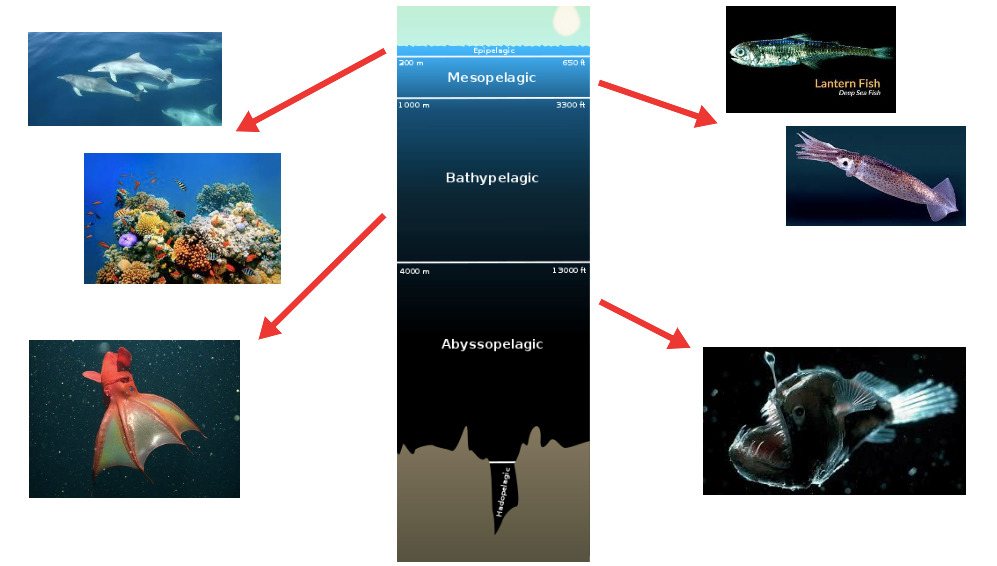Climate Change and Range Shifts: Is It Too Late for the Deep Ocean?
Many studies have looked at the effect of climate change in the surface waters of the ocean. We understand that ocean acidification is harming species that create calcium carbonate shells or skeletons, and that coral reef ecosystems are being bleached and subsequently destroyed due to warming sea surface temperatures. We also know that a large range of taxa are moving poleward in order to remain within their climatic niche. The rate at which species migrate to follow suitable conditions is called climate velocity.
However, we know very little about the deep ocean. In fact we know more about the surface of the moon and we are discovering new species on almost every expedition to the deep. One thing we do know is that warming is occurring at slower speeds in the deep ocean compared to surface waters. This has led to the perception that the deep oceans are less exposed to climate change than the surface waters which is far from the truth. A team of scientists led by the University of Queensland have shown that despite these misconceptions that the deep ocean is immune to climate change, it has greater climate velocities compared to the surface waters.
The climate velocity was predicted for a range of different climate projections at a number of different depths using data from AquaMaps – a comprehensive dataset with information on the distribution of over 20,000 marine species including invertebrates, vertebrates and macroalgae. The velocity was calculated for three future climate scenarios (2050-2100). The first (RCP 2.6) has emissions peaking now (2020) and then beginning to decline, the second scenario (RCP 4.4) has emissions declining from 2040, and the final scenario (RCP 8.5) has emissions continuing to rise throughout the 21st century. The climate velocities under these three projections were calculated at four different depth layers: at the surface (<200m); mesopelagic (200-1000m); bathypelagic (1000-4000); and abyssopelagic (>4000m).
Compared to climate velocities calculated for the decade 1995-2005, projected climate velocities in the future increase for each depth and scenario, except that for the surface under RCP 2.6. This means that even if we use the most aggressive greenhouse gas (GHG) mitigation strategies and manage to stop the increase in emissions from today, we are facing an unavoidable increase in climate velocities in the mesopelagic, bathypelagic and abyssopelagic. Therefore, measures aiming to reduce GHG emissions may be successful at alleviating the effects of climate change in the surface waters, but it will have limited benefits at greater depths.
What does this mean for the deep oceans? Firstly, there will be a relatively rapid reorganisation of species. This rate is probably due to species in the deep sea being adapted to very stable environments, and so slight changes take them out of their climatic niche and require a migration to a more suitable habitat. It is likely most of these species will move poleward, although this isn’t guaranteed and many species will move at different rates and different directions.
The mesopelagic is predicted to have the greatest climate velocities under future projections, up to 20 times higher than its current velocity. This layer is home to a huge amount of life, including the communities of lantern fish, the most abundant vertebrate on the planet and an extremely important food source in the ocean. A change in the distribution of these species could dramatically alter food availability for species that are important for the health of the ocean such as sharks or for those that are important for commercial fishing such as tuna. If species tracking their thermal niche move in different directions, it could cause range mismatches across depths, compromising vertical food webs. The huge amount of biomass in the mesopelagic layer is also important in vertical carbon and nitrogen transfer to the deep ocean through respiration and excretion. It is unknown how this will be affected under different climate projections.
To allow species to adapt to a changing climate as well as possible, future marine protected areas (MPA’s) must take into account the potential range shift of the species it is aimed to protect, a very difficult task when species can move at different speeds and in contrasting directions. However, if done successfully these marine protected areas that would limit other threats such as deep ocean fishing or mining would increase the resilience of ecosystems to climate change, potentially reducing climate velocities.
Brito-Morales, I., Schoeman, D.S., Molinos, J.G., Burrows, M.T., Klein, C.J., Arafeh-Dalmau, N., Kaschner, K., Garilao, C., Kesner-Reyes, K. and Richardson, A.J., 2020. Climate velocity reveals increasing exposure of deep-ocean biodiversity to future warming. Nature Climate Change , pp.1-6.
2020
SHARE THIS ARTICLE















